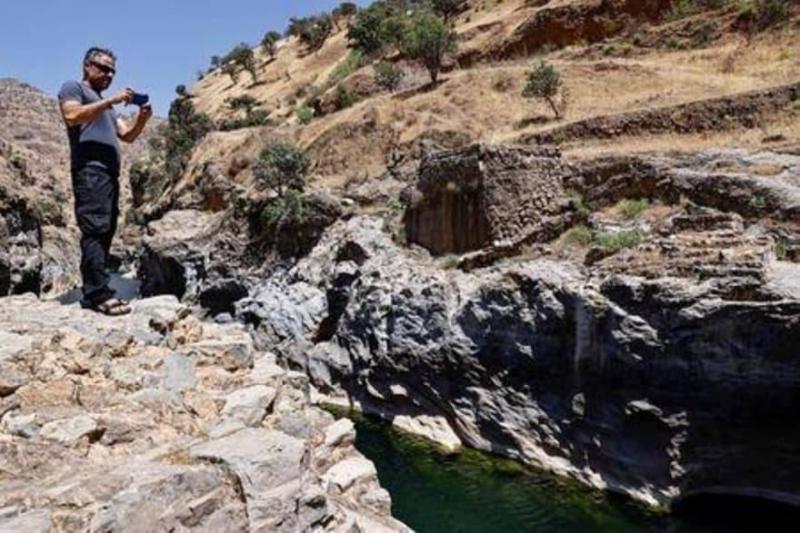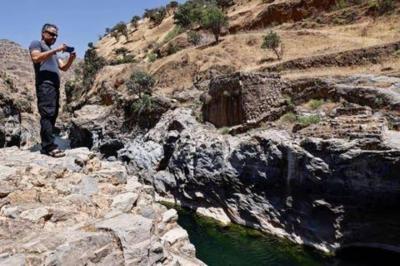Nabil Mousa, pointing to the dried riverbed, said, "There used to be a river where we stand now." In his view, the decline of the Sirwan River, once mighty and now reduced to a small, quiet stream, is due to Iranian control over its water. With this year's lack of rainfall, Iraq is facing a severe shortage in water supply. Officials working to revitalize rivers like the Sirwan say that diminished flows from upstream countries Iran and Turkey exacerbate local issues such as leaks, aging pipelines, and illegal withdrawals.
Iran and Turkey are building large dams to address their own water shortages, while regional cooperation on this matter remains inconsistent. Iraqi officials stated that the Dariyan Dam across the border in Iran redirects parts of the Sirwan River back into Iranian territory through a 48-kilometer tunnel. Iranian officials contacted by Reuters declined to comment, while Iran has stated that the dam is still under construction.
Residents of Iraqi villages have been feeling the effects of reduced water flows from Iran for the past two years, complaining that this scarcity has had a harsh impact on downstream communities, especially during increasingly frequent drought years. Fisherman Ahmed Mahmoud from the village of Imam Zamani, where the river is drying up and most of the 70 families have left, said, "I stopped fishing two years ago... If it continues like this, we will also have to leave."
The Sirwan River originates in Iran, flows along the border with Iraq, then enters the semi-autonomous Kurdistan region of Iraq, before bending south to meet the Tigris River. Once a full river, it is now marked with gauges showing levels that were previously reached. When a heatwave hit the drought-stricken region in July, Iraq warned that the situation in Diyala province, where the river flows into, would worsen if no agreement was reached with Iran, which accounts for about 18 percent of Tigris River water, on sharing "the damage" caused by the reduced water flows.
In an effort to adapt, Baghdad has reduced summer agricultural areas in Diyala for both irrigated and rain-fed farming to 30 percent of last year's area and has dug wells to support affected farmers. A senior Iranian foreign ministry official, when asked about Iraq's claims that Iran is reluctant to discuss the water crisis, pointed out that drought in Iran has caused power outages and protests. He added to Reuters that establishing schedules for meetings to discuss the issue would take time due to the recent formation of a new government in Iran. He stressed, "But I must emphasize that due to the water crisis, addressing our local needs will be our top priority, followed by the needs of our neighbors."
The water crisis in Iraq has been building for nearly 20 years. Aging infrastructure and short-term policies have made Baghdad vulnerable to the impacts of climate change and reduced flows from Iran and Turkey, which account for about 70 percent of the water in the Tigris and Euphrates rivers. Aoun Dhiab, spokesperson for the Iraqi Ministry of Water Resources, told Reuters that as of June, inflows from Iran and Turkey have declined by half.
The Turkish foreign ministry did not immediately respond to a request for comment. Iraqi officials say that negotiations with Turkey on how much water it will allow to flow to Iraq are challenging, but at least they are ongoing. In contrast, Iraq is not engaged in any discussions regarding water with Iran, which has built at least 600 dams in the country over the past thirty years.
Mousa, the environmental activist, noted that sometimes Iran allows water to flow to Iraq "but we do not know in advance when the flow will come or its magnitude." In June, Iraqi water officials unsuccessfully sought to hold a meeting with Tehran to discuss the water shortage and request information about Iran's water resource management strategy. Dhiab told Reuters, "We gather information through satellite images about dam conditions and storage volumes in both Turkey and Iran, but we prefer to obtain it through diplomatic channels."
At a summit in Baghdad on August 28, Middle Eastern countries, including Iran, discussed regional cooperation, but water policy issues were not on the agenda. An Iraqi diplomat, speaking on condition of anonymity, as they were not authorized to talk to the media, said, "We avoided contentious issues... like water."




